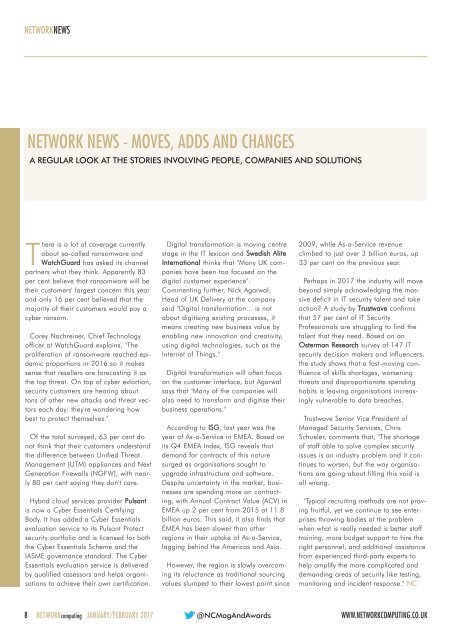NC1701
You also want an ePaper? Increase the reach of your titles
YUMPU automatically turns print PDFs into web optimized ePapers that Google loves.
NETWORKNEWS<br />
NETWORK NEWS - MOVES, ADDS AND CHANGES<br />
A REGULAR LOOK AT THE STORIES INVOLVING PEOPLE, COMPANIES AND SOLUTIONS<br />
There is a lot of coverage currently<br />
about so-called ransomware and<br />
WatchGuard has asked its channel<br />
partners what they think. Apparently 83<br />
per cent believe that ransomware will be<br />
their customers' largest concern this year<br />
and only 16 per cent believed that the<br />
majority of their customers would pay a<br />
cyber ransom.<br />
Corey Nachreiner, Chief Technology<br />
officer at WatchGuard explains, "The<br />
proliferation of ransomware reached epidemic<br />
proportions in 2016 so it makes<br />
sense that resellers are forecasting it as<br />
the top threat. On top of cyber extortion,<br />
security customers are hearing about<br />
tons of other new attacks and threat vectors<br />
each day: they're wondering how<br />
best to protect themselves."<br />
Of the total surveyed, 63 per cent do<br />
not think that their customers understand<br />
the difference between Unified Threat<br />
Management (UTM) appliances and Next<br />
Generation Firewalls (NGFW), with nearly<br />
80 per cent saying they don't care.<br />
Hybrid cloud services provider Pulsant<br />
is now a Cyber Essentials Certifying<br />
Body. It has added a Cyber Essentials<br />
evaluation service to its Pulsant Protect<br />
security portfolio and is licensed for both<br />
the Cyber Essentials Scheme and the<br />
IASME governance standard. The Cyber<br />
Essentials evaluation service is delivered<br />
by qualified assessors and helps organisations<br />
to achieve their own certification.<br />
Digital transformation is moving centre<br />
stage in the IT lexicon and Swedish Alite<br />
International thinks that "Many UK companies<br />
have been too focused on the<br />
digital customer experience".<br />
Commenting further, Nick Agarwal,<br />
Head of UK Delivery at the company<br />
said "Digital transformation... is not<br />
about digitising existing processes, it<br />
means creating new business value by<br />
enabling new innovation and creativity,<br />
using digital technologies, such as the<br />
Internet of Things."<br />
Digital transformation will often focus<br />
on the customer interface, but Agarwal<br />
says that "Many of the companies will<br />
also need to transform and digitise their<br />
business operations."<br />
According to ISG, last year was the<br />
year of As-a-Service in EMEA. Based on<br />
its Q4 EMEA Index, ISG reveals that<br />
demand for contracts of this nature<br />
surged as organisations sought to<br />
upgrade infrastructure and software.<br />
Despite uncertainty in the market, businesses<br />
are spending more on contracting,<br />
with Annual Contract Value (ACV) in<br />
EMEA up 2 per cent from 2015 at 11.8<br />
billion euros. This said, it also finds that<br />
EMEA has been slower than other<br />
regions in their uptake of As-a-Service,<br />
lagging behind the Americas and Asia.<br />
However, the region is slowly overcoming<br />
its reluctance as traditional sourcing<br />
values slumped to their lowest point since<br />
2009, while As-a-Service revenue<br />
climbed to just over 3 billion euros, up<br />
33 per cent on the previous year.<br />
Perhaps in 2017 the industry will move<br />
beyond simply acknowledging the massive<br />
deficit in IT security talent and take<br />
action? A study by Trustwave confirms<br />
that 57 per cent of IT Security<br />
Professionals are struggling to find the<br />
talent that they need. Based on an<br />
Osterman Research survey of 147 IT<br />
security decision makers and influencers,<br />
the study shows that a fast-moving confluence<br />
of skills shortages, worsening<br />
threats and disproportionate spending<br />
habits is leaving organisations increasingly<br />
vulnerable to data breaches.<br />
Trustwave Senior Vice President of<br />
Managed Security Services, Chris<br />
Schueler, comments that, "The shortage<br />
of staff able to solve complex security<br />
issues is an industry problem and it continues<br />
to worsen, but the way organisations<br />
are going about filling this void is<br />
all wrong.<br />
"Typical recruiting methods are not proving<br />
fruitful, yet we continue to see enterprises<br />
throwing bodies at the problem<br />
when what is really needed is better staff<br />
training, more budget support to hire the<br />
right personnel, and additional assistance<br />
from experienced third-party experts to<br />
help amplify the more complicated and<br />
demanding areas of security like testing,<br />
monitoring and incident response." NC<br />
8 NETWORKcomputing JANUARY/FEBRUARY 2017 @NCMagAndAwards<br />
WWW.NETWORKCOMPUTING.CO.UK

















